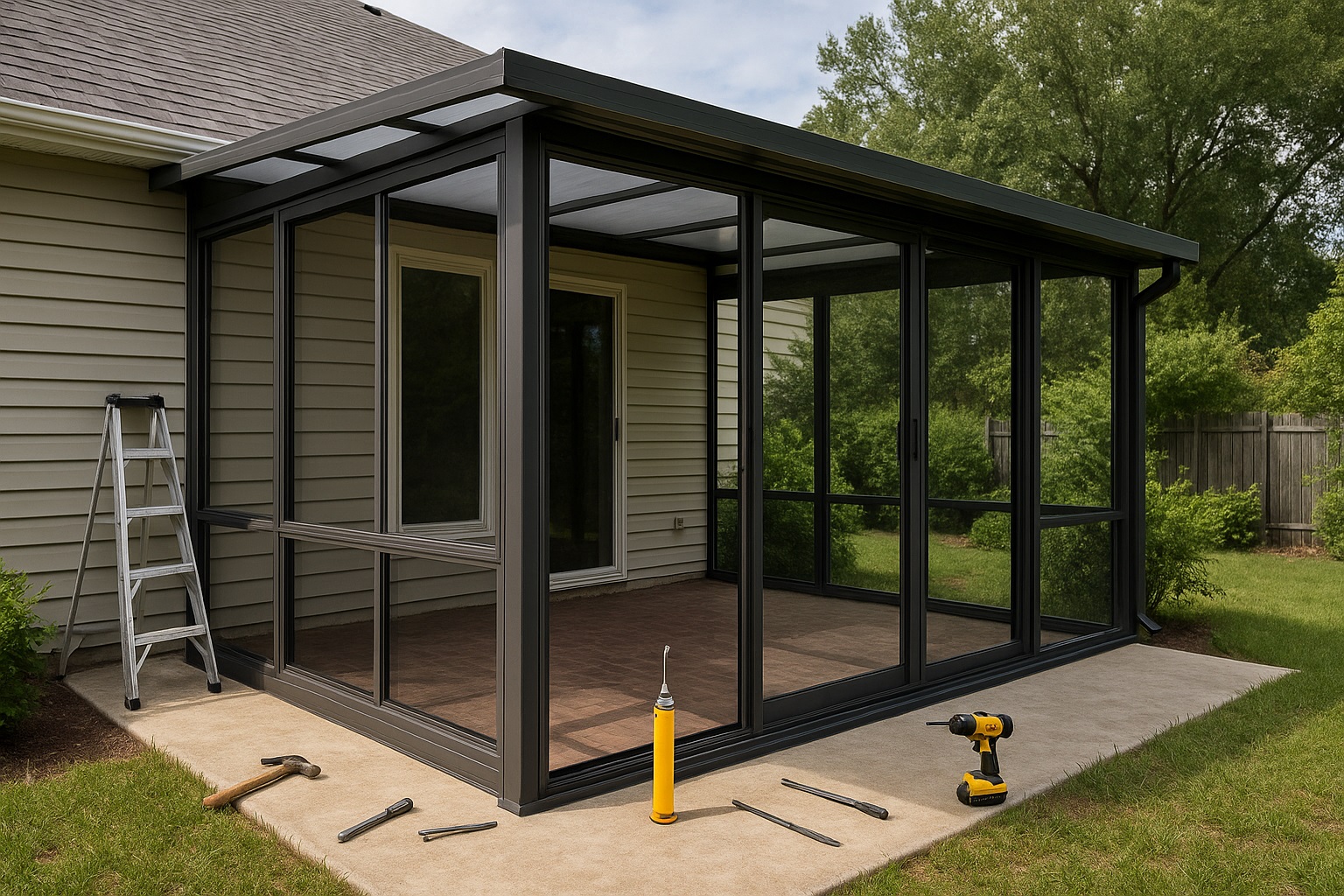
Single vs Double Hung Windows: A Complete Guide
When it comes to choosing the right windows for your home, the decision often narrows down to single vs double hung windows. At first glance, they may look quite similar, but the subtle differences between them can impact not only the appearance of your house but also the way you live in it day by day. As an interior architect, I often see homeowners confused about which one to choose. So in this guide, I’ll walk you through everything you need to know — from the basics of what are single hung and double hung windows to their efficiency, cost, and long-term performance. By the end, you’ll feel confident about making the right choice for your home.
What Are Single Hung and Double Hung Windows?
Before diving into comparisons, let’s clarify the basics. A single hung window has two sashes (the framed glass panels), but only the bottom sash moves vertically while the top sash remains fixed. On the other hand, a double hung window allows both the top and bottom sashes to slide up and down. This means double hung windows offer more flexibility for ventilation, while single hung windows keep things simple.
- Single Hung Windows: Bottom sash moves, top sash is fixed.
- Double Hung Windows: Both top and bottom sashes move.
This fundamental design difference may sound small, but it affects everything from energy efficiency to cleaning convenience and even how comfortable your living space feels.
The Key Difference: Single and Double Hung Windows in Practice
So, what’s the real difference single and double hung windows bring to your daily life? From my professional perspective, the answer lies in how you use your space and what you expect from your windows.
For instance, if you live in a busy urban area with limited airflow, double hung windows give you better control over ventilation — you can lower the top sash to let hot air escape and raise the bottom sash to let cool air in. With single hung windows, you don’t have that option, but you do benefit from a simpler mechanism and often a slightly lower price point.
Single Hung vs Double Hung Window Efficiency
Efficiency is one of the biggest deciding factors when clients ask me for advice. Many homeowners wonder, “Is one more energy-efficient than the other?” Here’s the truth: in theory, single hung windows can be slightly more efficient because fewer moving parts mean fewer potential gaps where air could escape. However, modern double hung windows have improved drastically. With proper sealing and quality materials, their efficiency is almost on par with single hung models.
Let’s break it down:
| Feature | Single Hung | Double Hung |
|---|---|---|
| Air Leakage | Low (fewer moving parts) | Slightly higher, but modern seals minimize it |
| Insulation | Good baseline insulation | Comparable with energy-efficient glazing |
| Overall Efficiency | Marginally higher | Very close if high-quality |
In other words, the question of single hung vs double hung window efficiency depends largely on the manufacturer and installation quality rather than the window style itself.
Cost Considerations
Price is another factor many homeowners prioritize. Generally, single hung windows are more affordable due to their simpler design. The fewer moving components, the less labor and material involved. Double hung windows usually cost more upfront, but they may save you money in maintenance and cleaning convenience over time. If you’re replacing windows in a large property, this difference in cost can add up quickly.
Ease of Maintenance and Cleaning
Here’s a practical point many people overlook: cleaning. Single hung windows require you to clean the exterior from outside the house (which can be tricky on upper floors). Double hung windows solve this problem — both sashes tilt inward, making it easy to clean both sides from inside your home. From my experience, families with multi-story houses often lean toward double hung windows just for this reason.
Aesthetic and Design Impact
From a design perspective, both window types look almost identical when installed. The difference lies in functionality rather than appearance. That being said, some clients prefer the symmetry of double hung windows because both sashes align in terms of mobility. Single hung windows, however, tend to feel more traditional and are commonly seen in classic architectural styles.
Durability and Longevity
Durability comes down to construction quality and material rather than the hung type. Vinyl, wood, and fiberglass frames are available for both styles. However, because single hung windows have fewer moving parts, they tend to have slightly fewer mechanical failures over time. Still, high-quality double hung windows from a trusted manufacturer should last just as long if maintained properly.
Which Window Style Fits Your Lifestyle?
Let’s put everything together. Choosing between single vs double hung windows isn’t about which one is “better” overall, but about which one suits your lifestyle, budget, and home design. Ask yourself these questions:
- Do you value easy cleaning and better airflow control? → Go for double hung.
- Do you prefer a more affordable option with fewer moving parts? → Single hung might be your match.
- Is energy efficiency your biggest concern? → Both can perform well if you invest in quality models.
- Are you planning to sell your home soon? → Double hung may appeal more to buyers thanks to their flexibility.
Expert Insight: My Personal Take
As someone who works closely with homeowners, I often recommend double hung windows for families who want practicality and convenience, especially in two-story homes. But for smaller spaces or when budget is tight, single hung windows are perfectly reliable and stylish. Honestly, there’s no wrong choice here — just the right choice for your circumstances.
Single vs Double Hung Windows: Final Thoughts
So, now you know the difference single and double hung windows can make. While single hung windows keep things simple, double hung windows offer versatility. In the end, what matters most is choosing a window that aligns with your lifestyle, budget, and long-term comfort. Don’t rush this decision — your windows are one of the most important investments you’ll make in your home.
If you’ve been debating single hung vs double hung window efficiency or wondering which style to pick, I hope this guide helped clear things up. And if you still have questions, I’d love to hear them — feel free to leave a comment below or share your own experience. After all, we learn the most when homeowners share their stories with one another.
We’ve explored the ins and outs of single vs double hung windows, and by now you probably have a clearer idea of how these options compare. But here’s something I often see in my work: some homeowners step outside this traditional debate altogether and look toward a different standard that’s been shaping modern architecture across the globe — European windows. They bring a fresh perspective to the conversation, and it’s worth understanding what sets them apart.
What Are European Windows?
Before we dive into the comparison, let’s take a step back and understand what European windows actually are. Unlike the traditional single or double hung styles common in North America, European windows are designed with advanced tilt-and-turn mechanisms. This means the window can swing inward like a door, or tilt from the top for secure ventilation. From an architectural standpoint, these windows offer an entirely different user experience — one that focuses on flexibility, energy efficiency, and ease of use.
European windows often feature multi-point locking systems, triple-pane glazing, and robust thermal insulation. They are engineered not only for looks, but also for performance. If you’ve ever traveled through Europe, you may have noticed how naturally these windows integrate into both modern and historic buildings, proving their versatility across architectural styles.
Why Use European Windows Instead of Single/Double Hung Windows?
Now comes the big question: why should you consider European windows instead of the more familiar single or double hung windows? The answer lies in the combination of functionality, comfort, and long-term value. As an interior architect, I’ve seen homeowners make the switch, and the benefits become obvious almost immediately.
- Superior Energy Efficiency: European windows are designed with thicker frames, multiple seals, and advanced glazing. Compared to single or double hung windows, they dramatically reduce heat loss and improve sound insulation. In other words, your energy bills stay lower, and your home feels quieter and cozier.
- Better Ventilation Control: The tilt-and-turn feature allows for safe airflow without fully opening the window. This means you can ventilate even during rainy weather without worrying about water entering. Single and double hung windows don’t offer this level of precision.
- Enhanced Security: Multi-point locking systems make European windows far more resistant to forced entry. For families prioritizing safety, this is a major advantage.
- Ease of Cleaning: Just like double hung windows, European windows let you clean both sides from inside your home. In fact, because they open fully inward, the cleaning process is even simpler and faster.
- Modern Aesthetics: With sleek lines and larger glass surfaces, European windows often provide a more contemporary look. They bring in more natural light and complement modern interior design trends effortlessly.
To put it simply, while single vs double hung windows remains a common debate in North America, European windows step outside that conversation by offering a different standard altogether. They’re not just an alternative — they’re a higher-performing option for homeowners who value efficiency, comfort, and design in equal measure.
Should You Make the Switch?
If you’re weighing the difference between single and double hung windows but also wondering about long-term performance, it might be time to broaden your perspective. European windows cost more upfront, yes, but they also add measurable value through energy savings, comfort, and security. In my professional opinion, they represent a future-proof choice. If you’re building a new home or renovating with longevity in mind, it’s worth asking yourself: do I want windows that simply do the job, or windows that redefine how I experience my living space?
Ultimately, the choice depends on your priorities. If budget is the top concern, single hung windows are a safe and cost-effective option. If flexibility matters, double hung windows give you versatility. But if you want the best balance of performance, security, and aesthetics, European windows may be the investment that transforms not just your house, but your quality of life inside it.








Leave a Reply
You must be logged in to post a comment.